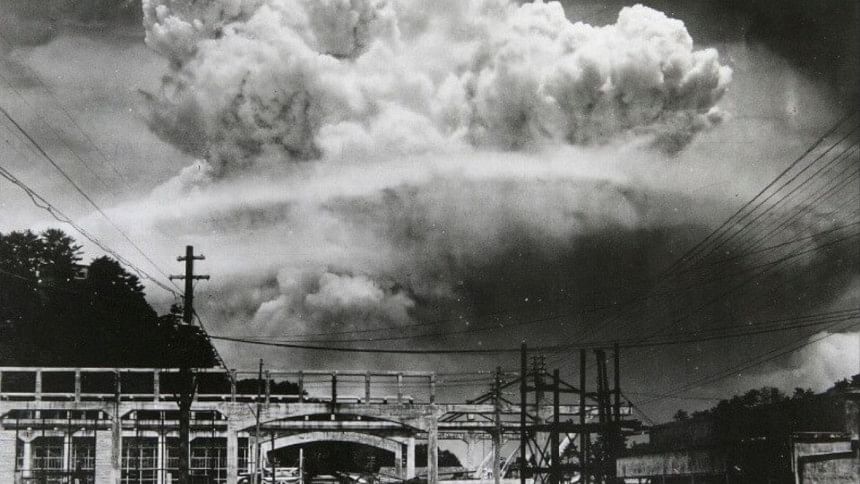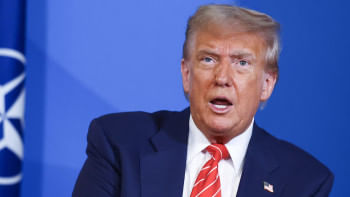Nagasaki Day: “A peep into hell”

The atomic age began with the US dropping the first atomic bomb dubbed "Little Boy," on August 6, 1945, on the Japanese city of Hiroshima, after its July 16 pre-dawn birth in successful testing at Alamogordo, New Mexico. Three days later, on August 9, 1945, the second bomb—"Fat Man"—was dropped on Nagasaki, incinerating the city and its unexpecting inhabitants. Their combined devastation was so unimaginable, that it caused Robert Oppenheimer, largely considered to be the "father of the atomic bomb," to say, quoting the Bhagavad Gita, "Now I am become Death, the destroyer of worlds."
Having dropped the A-bomb on Hiroshima, Brigadier-General Paul Warfield Tibbets Junior—pilot of the first plane (Enola Gay) to drop the atomic bomb—said to have blinked from the flash behind his goggles. When he opened his eyes to look down, what he saw, he described as "a peep into hell." At least 200,000 died from the combined hellish force of the two atomic bombs, many more were scarred for life, including future generations harmed by radiologically caused birth defects, etc. The co-pilot of the Enola Gay, Robert Lewis, wrote in his flight log, "My God! What have we done?"
Unfortunately, what they had done was, and continues to be, deceitfully described as a "necessary evil"—a fait accompli—till date; beginning with a radio speech delivered on the same day as the bombing of Nagasaki by President Harry Truman, who said, "The world will note that the first atomic bomb was dropped on Hiroshima a military base [known to be untrue by the US top brass]. That was because we wished in this first attack to avoid, insofar as possible, the killing of civilians [emphasis mine]," which has been contested by many, and not without evidence.
Prior to the bombs being dropped, US Secretary of War Henry Stimson, for example, briefed General Dwight Eisenhower on their imminent use, saying Japan was "already defeated" and that "dropping the bomb was completely unnecessary." After its use, Joint Chiefs Chairman Admiral William Leahy called the atom bomb "a barbarous weapon" and said that the "Japanese were already defeated and ready to surrender."
In addition, four days before President Truman, Prime Minister Churchill and Premier Stalin met in Potsdam in mid-July to discuss post-war issues two months after Nazi Germany's defeat, a telegram from Japanese Foreign Minister Shigenori Tōgō to Moscow read, "It is his Majesty's heart's desire to see the swift termination of the war." This message was intercepted and known by the US intelligence, which had broken Japanese codes even before the war began, and had been reading Japan's diplomatic messages at least from the summer of 1940.
Even the top US commander in the Pacific, General Douglas McArthur admitted that the Japanese were "already beaten" by the time the bomb was dropped, a view endorsed by the head of US air operations in the Pacific, General Curtis LeMay, who said, "Even without the atomic bomb and the Russian entry into the war, Japan would have surrendered in two weeks." This has led many to speculate that they were dropped as a warning to all those planning to oppose the US's post-war supremacy, particularly the Soviet Union; and that the lives of the many thousands of Japanese victims were considered merely a small price to pay to achieve that. Overlooking the fact that terror bombing is an international high crime, as Article 25 of the Laws of War: Laws and Customs of War on Land (1907 Hague IV Convention) states that, "The attack or bombardment, by whatever means, of towns, villages, dwellings, or building which are undefended is prohibited" and the post-WWII Geneva IV, which protects civilians in time of war, prohibiting violence of any type against them and the 1945 Nuremberg Principles which forbid "crimes committed against any civilian population, before or during the war," notably indiscriminate killing and "wanton destruction of cities, towns, or villages, or devastation not justified by military necessity."
More than 70 years later, we see similar dangers re-emerging today, as the world shockingly seems to have forgotten the horrors unleashed on Hiroshima and Nagasaki, and the dangers of nuclear war and annihilation. As a result, "All the safeguards of the Cold War era, which categorised the nuclear bomb as a 'weapon of last resort,' have been scrapped," explains Michel Chossudovsky, Professor Emeritus of Economics at the University of Ottawa.
Moreover, "The Pentagon's 2001 Nuclear Posture Review [NPR] envisaged so-called 'contingency plans' for an offensive 'first strike use' of nuclear weapons, not only against 'axis of evil' countries (including Iran and North Korea) but also against Russia and China." And that "tactical nuclear weapons or so-called mini-nukes with an explosive capacity between one-third and six times a Hiroshima bomb are considered, according to scientific opinion, on contract to the Pentagon as 'harmless to the surrounding civilian population because the explosion is underground'." This, he says, is "a lie". And as common sense dictates, is madness.
Professor Christopher Busby, Scientific Secretary of the European Committee on Radiation Risk based in Brussels, says that "modern thermonuclear warheads...pack about 800kT (kilotonnes)," whereas the ones dropped on Hiroshima and Nagasaki were 13kT and 20kT, respectively. Given this, he suggests that all who have the capacity should refrain from sanctioning the final nuclear exchange "on the mistaken prediction that such an event will be winnable."
Yet we are today the closest we have ever been to nuclear annihilation—"two and a half minutes to midnight" on the doomsday clock, for the first time in history—according to the Bulletin of the Atomic Scientists. And the fact that we are completely oblivious to that, as made evident by a 2016 CBS News poll, which revealed that 43 percent of US residents still approve of the US's use of nuclear bombs against Japan, is perhaps the greatest danger of all.
Tommy Yang, an 85-year-old survivor in the atomic bombing of Nagasaki said in an interview that "Nuclear weapons are not just weapons. It's a devil's tool. It cannot co-exist with the [sic] mankind." It is perhaps time for us to realise that ourselves. And also understand, as Professor Chossudovsky opines, that "The bombs of August [Hiroshima and Nagasaki] are an ominous reminder that what happened to Japan can repeat whenever lunatics in Washington believe it to their advantage [emphasis mine]. Humanity may not survive their madness." And with the realisation and understanding to work towards eradicating nuclear weapons completely before allowing them to eradicate humanity from the face of the earth as was done during the split seconds it took to bomb Hiroshima and Nagasaki; which in no uncertain terms were crimes of the most inhumane kind to have ever been perpetrated by humanity—against itself.
Eresh Omar Jamal is a member of the editorial team at The Daily Star.









Comments